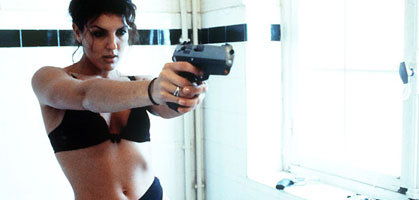
Baise-moi
France 2000

Reviewed by Ginette Vincendeau
Synopsis
Our synopses give away the plot in full, including surprise twists.
Paris, the present. We follow the lives of two young women. Nadine (Karen Bach) likes to watch porn films and is an occasional prostitute. Manu (Raffaëla Anderson) is gang-raped while out with a girlfriend. She accidentally kills her best friend, while Nadine strangles her room-mate. The two women meet after Nadine's drug-addict friend is shot, and they escape to the sea in Nadine's car.
They bond and begin to steal, take drugs and have sex with men together (though not with each other). They steal a woman's credit card, draw her cash and kill her. They pick up two young men and have group sex, steal a car, kill its owner, and then kill a sales assistant in a gun shop. They lure a middle-aged man on whom Manu performs oral sex. When he objects to sex without a condom, and to Manu laughing at him, they beat him to death. Their pictures appear in the newspapers. They shoot a man in the street and move on to a posh hotel. While Nadine has sex with the owner, Manu has sex with a man in the street. Driving to a road block, they kill the police, pick up a third woman, follow her home, and meet her brother. They rob the safe of a rich writer whom they humiliate and kill. In a sex club they kill everyone, and torture a man before shooting him in the anus. They drive on. At a service station, Manu is shot dead. Nadine takes her to a lake and burns her body. As she is about to shoot herself she is arrested by the police.
Review
Baise-moi ('Fuck me') boils down to a killing and (real) sex rampage by two disaffected young women - Manu from a beur working-class milieu, Nadine from a slightly more bourgeois background - who come together after Manu's rape and the death of Nadine's best friend; each of them has also just committed a murder, albeit accidentally. Their breakneck journey in stolen cars with sex stopovers is a long suicidal run that inevitably ends in tears. The film has been referred to as a sexually graphic Thelma & Louise, especially since Manu's rape is presented as the trigger for their trajectory. Baise-moi invites comparisons to other movies. For instance, Nadine watches the dystopian (and similarly controversial) Seul contre tous on television while turning a trick in a hotel room, and later plays with her gun in a replica of the Venice bedroom scene in Luc Besson's Nikita (1990). The older cinephile may also remember A Clockwork Orange: Baise-moi displays the same sardonic delight in mindless violence and repeat sex, the same mixture of energy, rage and exhilaration.
Baise-moi comes to the UK with a long pedigree of French polemics. It is the adaptation of an eponymous novel by the (then) 25-year-old porn-shop assistant turned writer Virginie Despentes, the publishing sensation of 1995. Despentes teamed with porn actress Coralie Trinh Thi to shoot the adaptation, starring two other porn actresses, Raffaëla Anderson (Manu) and Karen Bach (Nadine). The Cannes premiere in May 2000 provoked dismay: the digital video image was "dingy", its erotic power nil, according to the Libération (male) reviewer. He asserted: "I tested it, impossible to have a hard-on," relegating the film to a new category of "post-porn". By contrast, its release in early July 2000 elicited a chorus of support from artists and intellectuals, and there was huge controversy when it was granted an 'X' certificate - a logical classification according to the French X criteria (graphic real sex, sustained violence), but one which, given the tiny number of X cinemas, amounted to censorship. Catherine Breillat launched a petition on 5 July to overturn the rating, signed by other prominent film-makers such as Jean-Luc Godard, claiming that to support the film was to "defend freedom". Le Nouvel Observateur, on the other hand, accused Baise-moi of being a fascist film, merely a female sex version of Rambo. Eventually Baise-moi was quietly re-released in France in September 2001 with an ordinary 18 certificate.
Baise-moi is not a conventionally enjoyable film. Its image is grungy, its litany of violence indiscriminate, its secondary characters confused and confusing. Yet it makes two simple points which mean that it is worth seeing, and which distinguish it from the models it quotes - Seul contre tous, Nikita - as well as from auteurs' sex movies such as Intimacy and Romance. One is to do with violence, the other with sex. Baise-moi gives power to women; or rather, it is about women taking power, though not, to be sure, in a politically correct manner. Manu and Nadine cut a swathe through men - repulsive or attractive, they don't care. They also kill two women, but one of these murders is accidental (Nadine's room-mate), the other instrumental (a woman whose credit card they steal). Neither has the vicious brutality of the male murders which are dwelt upon: the man in the hotel room, the writer, the man in the sex club. Such murders can be read as the women's response, using both sex and violence, to a generalised climate of male violence against women, as seen at the beginning.
The other point in favour of Baise-moi is that the women actually enjoy sex (not just violence), in contrast to contemporary auteur films, including those by female directors, in which sex is, invariably, grim and joyless. It's about girls having fun with sex and being able to laugh about it. One of the English-language release titles of this film, Rape Me, in this respect is a shocking travesty of the original French. 'Baise-moi' may seem stark, but it connotes pleasure and literariness ('baiser' also means kiss), contrasting with the more brutal slang du jour ('niquer', etc.) used in the film.
Baise-moi is rough and unpleasant but Manu and Nadine have humour, sass and a raw energy that transcends the horror. They are thoroughly bad girls acting out a lurid fantasy of power and impunity (roaming freely through France despite a trail of careless killings). In the passage from book to film, the two women have become noticeably better looking. And so has the violence, which has in one case been excised (the murder of a young boy), and otherwise abbreviated, allegorised and stylised, through rapid cuts, framing and the use of red filters. Personally, I am not complaining.
Credits
- Directors
- Virginie Despentes
- Coralie Trinh Thi
- Producer
- Philippe Godeau
- Screenplay
- Virginie Despentes
- Coralie Trinh Thi
- Based on the novel by
- Virginie Despentes
- Directors of Photography
- Benoît Chamaillard
- Julien Pamart
- Editors
- Aïlo Auguste
- Francine Lemaîttre
- Véronique Rosa
- Art Directors
- Irène Galitzine
- Paul Fayard
- Christophe Mureau
- Claude Veyset
- Music/Music Arranger/ Conductor
- Varou Jan
